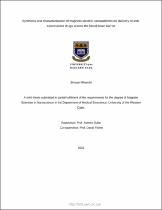| dc.contributor.advisor | Dube, Admire | |
| dc.contributor.author | Mhambi, Sinaye | |
| dc.date.accessioned | 2023-01-09T08:00:12Z | |
| dc.date.available | 2023-01-09T08:00:12Z | |
| dc.date.issued | 2022 | |
| dc.identifier.uri | http://hdl.handle.net/11394/9486 | |
| dc.description | >Magister Scientiae - MSc | en_US |
| dc.description.abstract | The anatomical structure of the brain at the blood–brain barrier (BBB) creates a limitation for the
movement of drugs into the central nervous system (CNS). Although anti-infective drugs effective
against Mycobacterium tuberculosis are known, the effective delivery of such drugs across the
BBB remains a major challenge. This is due in part to insufficient drug penetration across the BBB
of some anti-TB drugs. Large hydrophilic drugs such as ethambutol have poor cerebrospinal fluid
(CSF) penetration and cannot cross the BBB even when they are inflamed. Increasing the dose
of ethambutol in order to obtain higher CNS penetration is pernicious as it may result in systemic
toxicity. Drug delivery facilitated by magneto-electric nanoparticles (MENs) is a relatively new
non-invasive approach for the delivery of drugs into the CNS. These nanoparticles (NPs) can
create localized transient changes in the permeability of the cells of the BBB by inducing
electroporation. | en_US |
| dc.language.iso | en | en_US |
| dc.publisher | University of the Western Cape | en_US |
| dc.subject | Tuberculosis | en_US |
| dc.subject | Bioscience | en_US |
| dc.subject | Biology | en_US |
| dc.subject | Nanoparticles | en_US |
| dc.title | Synthesis and characterization of magneto-electric nanoparticles for delivery of antituberculosis drugs across the blood-brain barrier | en_US |
| dc.rights.holder | University of the Western Cape | en_US |

